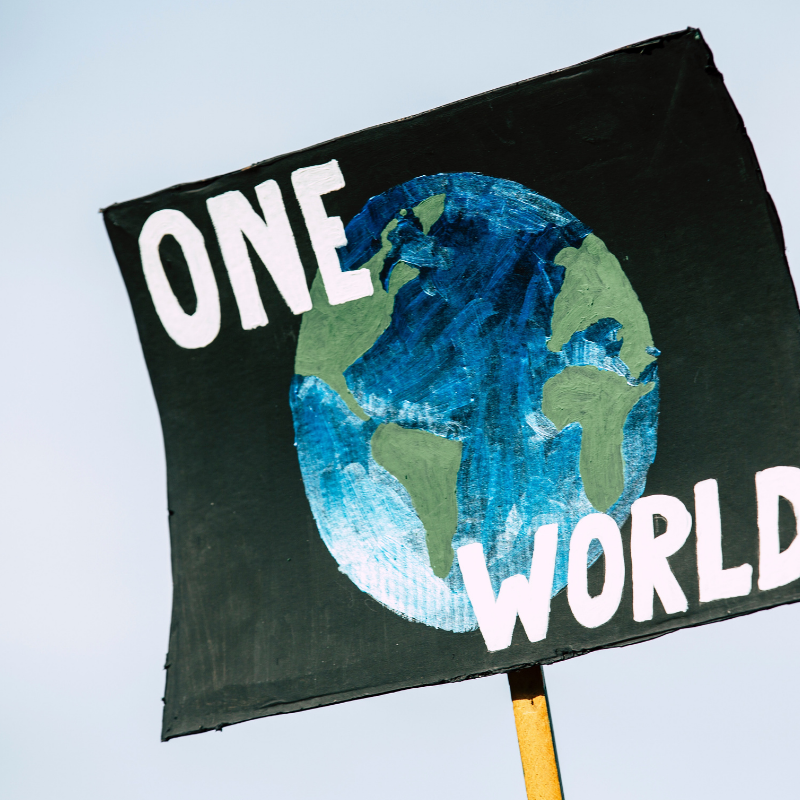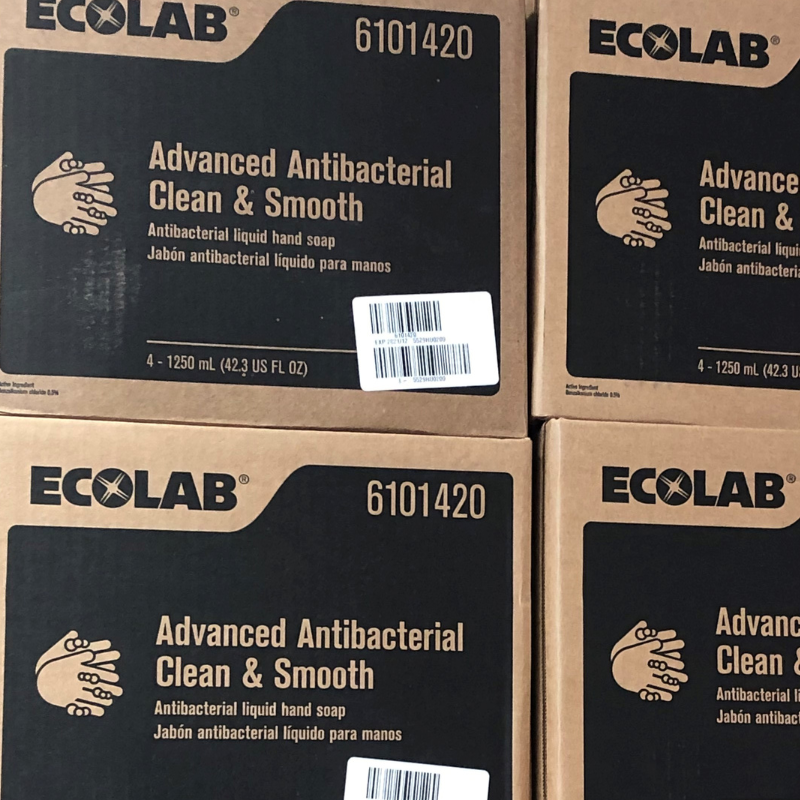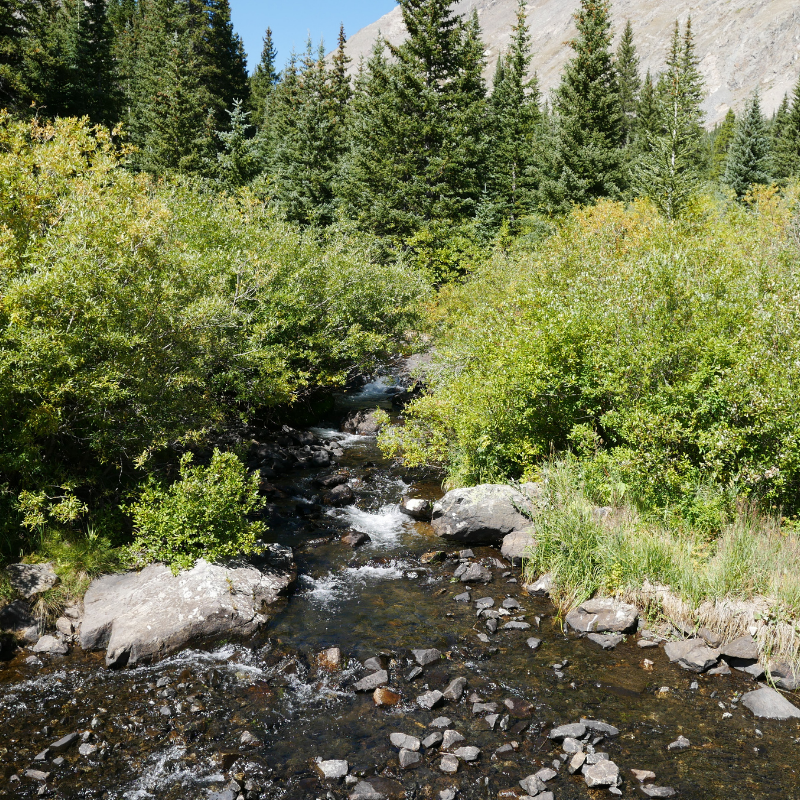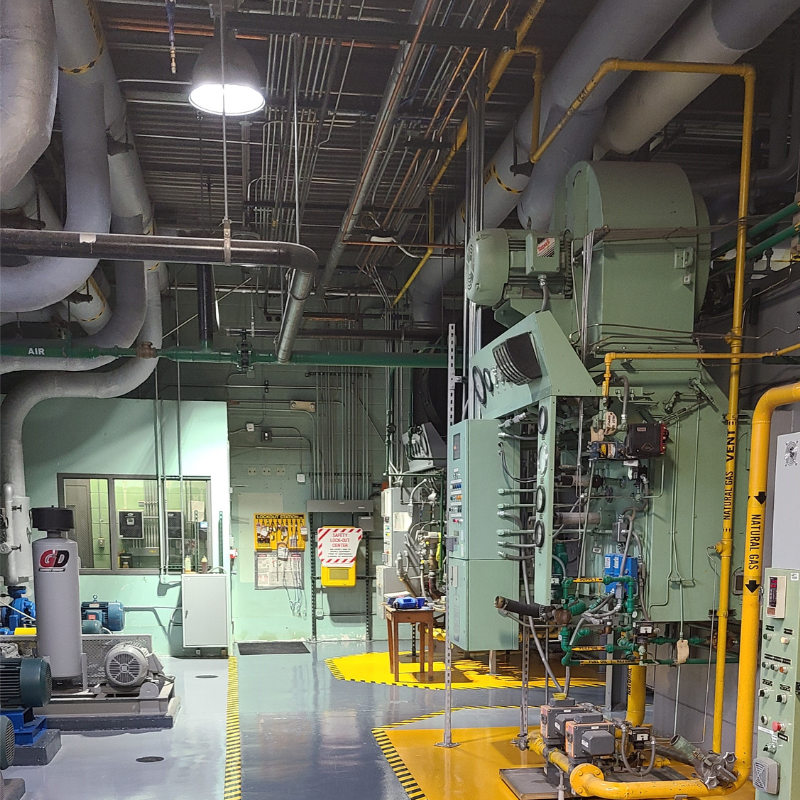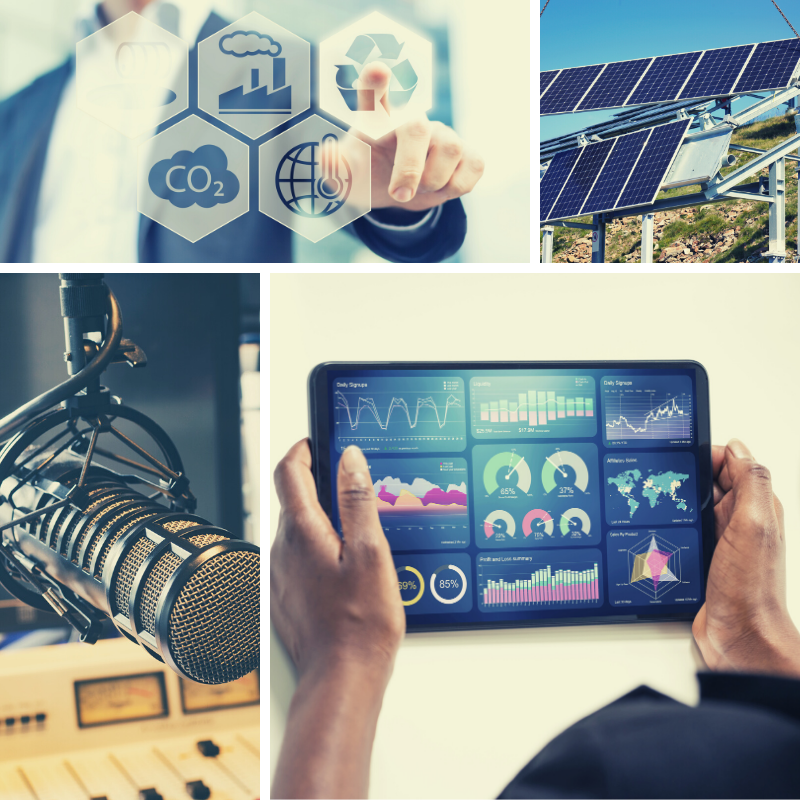Alumni Insights: Building Sustainability Careers After CC
When I mention someone whose job it is to advance sustainability, what do you picture? Is it a conservation officer in green trousers and a khaki shirt? Or an arctic explorer drilling for ice cores to read the climate history contained within them? What degree or training do they need? How do they get started in such a career?
In answering these questions about this person, did an analyst who develops project permits come to mind? How about a radio producer and host, or a financial analyst? A software developer and incubator?
The reality is that sustainability work takes all forms. Throughout this academic year, we’ve been highlighting specific examples of this – especially here at CC – with stories of work that supports and advances the United Nations Sustainable Development Goals (SDGs) across the campus each block. In practice, much of the sustainability work that happens at CC and beyond is done by people working in ‘allied professions’ – that is, professions that generally focus on other skills and outcomes, but that incorporate sustainability thinking (especially as outlined in the SDGs) into that work. The very breadth and interconnectedness of the SDGs dictates that this work not be done by a select few sustainability professionals, but that it be a more diffuse effort with advancements happening incrementally across the many allied professions.
We would be remiss to talk about professional careers without examining the role the Career Center at CC plays in connecting students’ liberal arts experiences to their professional journeys. Their mission directly impacts the Sustainable Development Goals of providing a Quality Education (Goal #4) and that of providing Decent Work and Economic Growth (Goal #8). Through that work, they also indirectly impact many of the other goals by connecting students to them through a wide range of professional paths. Briana Walls is the Career Center’s newest career coach. One of her focus areas is sustainability – that is, connecting students through their experiences at CC to sustainability-focused professions and the allied professions that support sustainability broadly in the professional sphere. She recently and graciously reached out to four of our recent grads to get some insight on how they’ve been navigating the professional world and incorporating sustainability efforts into their career paths.
Featured Alumni
Bryna Coyle

CC Graduation Year: 2019
Occupation: Financial Analyst
Workplace: Partners Group
Alex Drew

CC Graduation Year: 2015
Occupation: Project Coordinator
Workplace: Boyle Associates
Gabriella Palko
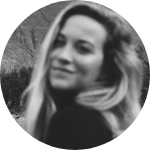
CC Graduation Year: 2016
Occupation: Environment Consultant &
Freelance Creative
Chris Edmonds

Occupation: Senior Associate
Workplace: Sustainability at Sidewalk Labs
A common theme in these alums’ career paths seemed to be how they circuitously or unexpectedly landed their current roles, which may be indicative of the intersectional nature of the SDGs:
“Throughout my time at CC, I always seemed to apply the lens of my major (Economics and Business) to the work I was doing with the Office of Sustainability, although I never really considered how a job or career could embody both my passion for sustainability and my interest in the business side of things,” explained Bryna Coyle ’19 about her work now as a financial analyst at Partners Group. Coyle works specifically with ESG (environmental, social, and governance) factors amongst investments with the goal of contributing to the achievement of the SDGs across investment categories. Some of the most readily understood areas these direct contributions can be made are by investments in companies that responsibly source their supply chains (Goal #12 – Responsible Consumption and Production), that properly represent society and their workforces in their decision-making (Goal #5 – Gender Equality; Goal #16 – Peace, Justice, and Strong Institutions), and that reinvest in their local communities (Goal #11 – Sustainable Cities and Communities).
Gabriella Palko ’16 seemed to agree. “I wasn't chasing opportunities... sustainability or environmental policy jobs in Boston or DC or back in Colorado... I was just looking to make my soul feel good [Goal #3 – Good Health and Well-Being]," said Palko, who relocated to Valdez, Alaska, after spending two years caring for her dad during his end-of-life stages. “ I just had faith in the process and in myself and just started taking some jobs that felt like they were innate to me... and from there, I’m realizing, “I have a lot of strengths!” She now fills multiple roles, including as a radio host and producer at the local NPR affiliate, as a freelancer creating words, photos, and other creative work for outdoor brands, and as an environmental consultant helping public and private sector entities develop and implement sustainability goals. “That’s my job: I’m getting paid to try to make this world a better place!”
“I never would have thought I’d be doing this work,” said Chris Edmonds ’14, who works as a Senior Associate at Sidewalk Labs, an urban technologies company with the mission to radically improve quality of life in cities for all. The company is developing offerings that make electrification affordable, reduce the embodied carbon of buildings with mass timber, and lower the energy consumption of both new master-planned neighborhoods and existing commercial buildings. (Goal #13 – Climate Action; Goal #9 Industry, Innovation, and Infrastructure; Goal #11 – Sustainable Cities and Communities). “While some of the work is technical, most of my day-to-day challenges are interpersonal communication, communicating complex ideas, and managing processes which all strike me as under-appreciated” (Goal #17 – Partnerships for the Goals).
Alex Drew ’15 took a detour exploring a career as an educator in Maine. While that directly impacted the SDG of Quality Education (Goal #4), she has since found herself working as a project coordinator for Boyle Associates – an environmental consulting firm in Portland, Maine – supporting the permit process for solar development projects (Goal #7 – Affordable and Clean Energy) and in delineating wetlands and assessing critical habitats (Goal #14 – Life Below Water and Goal #15 – Life on Land). “I would say that it was a bit random, yet overall, [I ended up in this role] through networking among friends in the field.”
Despite the different backgrounds, majors, and career paths of these alums, that theme of networking and becoming involved on the campus and/or community was another common piece that helped them connect, prepare, and land their current roles:
“People ask me, ‘Did you study environmental engineering or electrical engineering... where did you study software project management?’ and the answer is I didn't study any of those things, I studied political science and art.” Edmonds said. “What I learned at CC is how to work with people and communicate complex ideas.”
“I wasn't directly involved with any sustainability activities during my time at CC,” Drew explained, referring to the fact that she didn't’t work directly with the Office of Sustainability while she was on campus, “[but] my capstone project involved working on the Pike’s Peak treeline migration research project. Being a part of this experience, I was able to bring this knowledge to my interviews.”
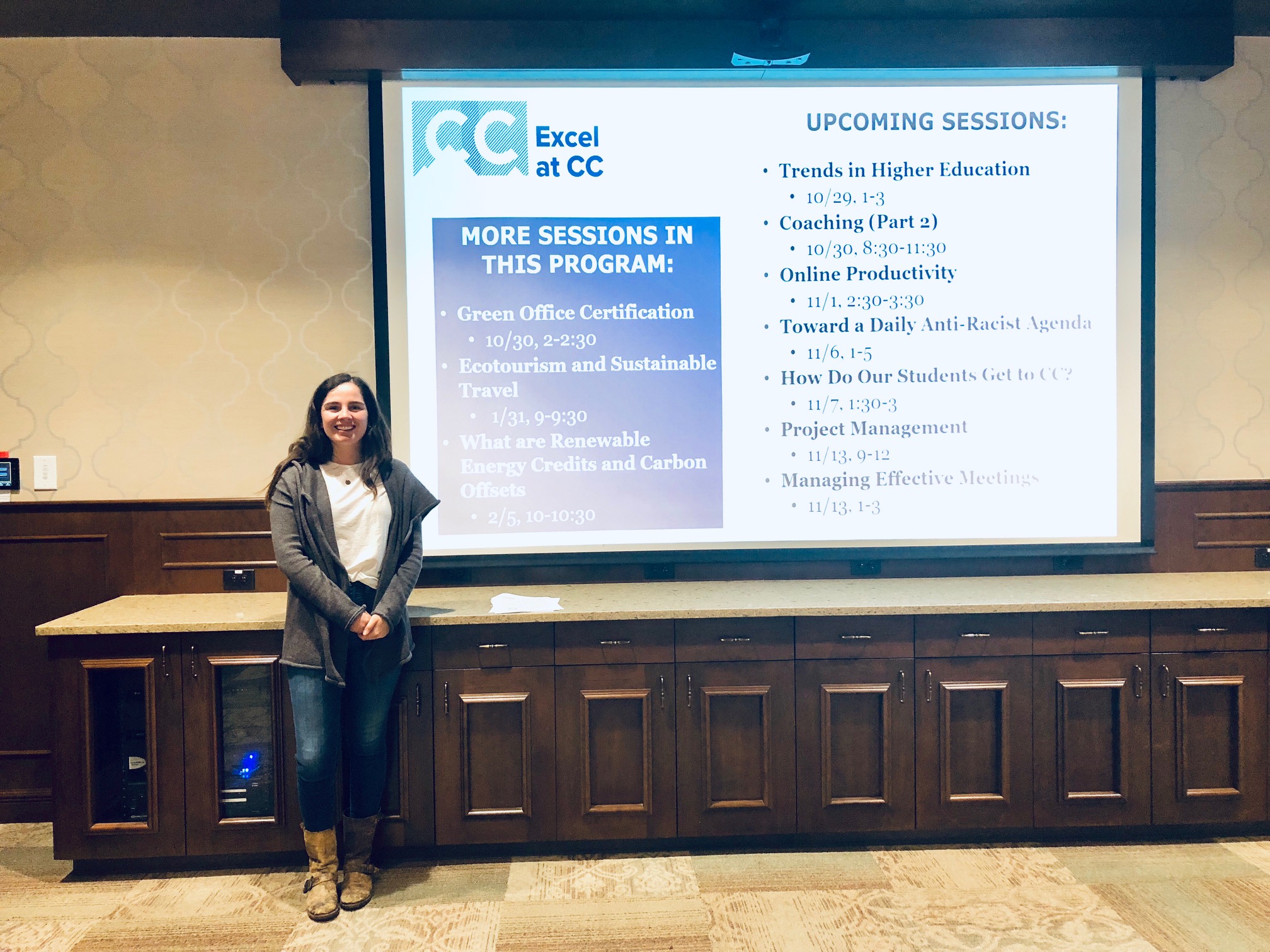
Coyle added, “I was a volunteer/intern for the Office of Sustainability for my four years at CC. I didn't even realize at the time how well it was preparing me for stepping into this role. It was so much fun and probably one of the best things I did during my time at CC. [It] allowed us to really explore the parts of sustainability that we were passionate about.” (Pictured Right: Coyle right before teaching the Excel@CC Waste Diversion course in spring 2018.)
“A lot of times I felt more like an employee of the college than like a student at the college,” Palko joked, “because I was always working, but that’s what I love to do. CC gave me the opportunity to learn real-world problem solving, to work with [Colorado Springs] Utilities, to work with faculty and staff and the Board of Trustees and the administration and students... CC had no roadmap for sustainability and carbon neutrality and let us students help build that map. And now in my career, I feel empowered to figure solutions that don’t exist yet.”
One of the main roles of the Career Center is to support our students’ desires to find meaningful work. That goal is one of the SDGs in and of itself (Goal #8), but it can also offer the opportunity to affect any of the other goals, and often several of them at once, depending on the role our students pursue. The four examples of alums above came from four different majors. Their work outlined affects at least 13 of the 17 SDGs on a regular basis. None of us can impact all of the goals at once, and none of us will move the world towards a more sustainable and thriving experience for all of the human population by ourselves. But, the purpose of a liberal arts education is to critically examine the ways in which we all operate; to find more meaning and purpose in our lives and our careers in order to contribute to that thriving experience. A place like CC provides the critical thinking skills to help navigate these difficult times, and the Career Center is dedicated to helping our students align those skills with meaningful work. Without their guidance and solid examples of how each of us can do that in our own ways, we’d be struggling even more to build a sustainable world. As with all of the examples we’ve highlighted this year, the Career Center plays a critical role in advancing sustainability work – one that is significantly multiplied as our students leverage their roles in society and through their professions.
By Ian Johnson
Special thanks to Briana Walls, Alex Drew '15, Gabriella Palko '16, Chris Edmonds '14, and Bryna Coyle '19




